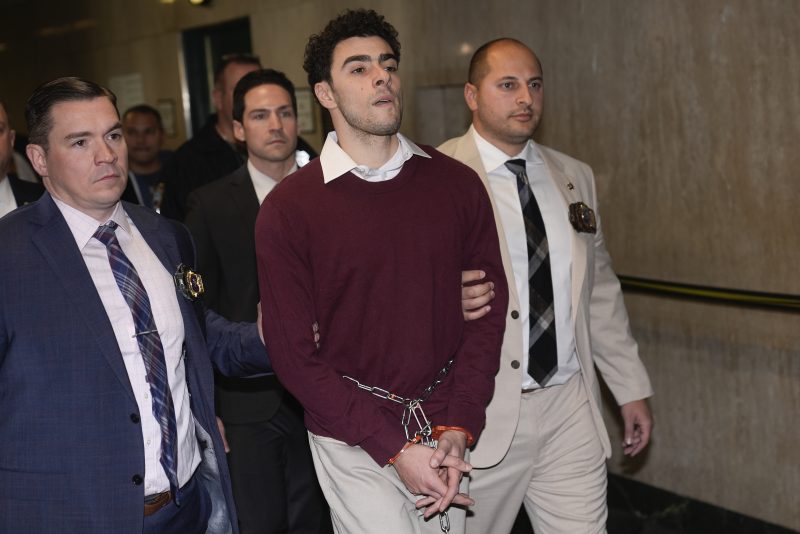Luigi Mangione pleads not guilty to state charges in death of UnitedHealthcare CEO

Luigi Mangione Pleads Not Guilty in UnitedHealthcare CEO Murder Case
Overview
Luigi Mangione, the man accused of fatally shooting the CEO of UnitedHealthcare, pleaded not guilty to state murder and terror charges in a Manhattan courtroom. The case has garnered significant attention, with federal prosecutors also bringing charges against Mangione. His attorney has expressed concerns about receiving a fair trial, citing comments made by New York Mayor Eric Adams.
The Legal Proceedings
Mangione’s initial court appearance in the state trial court was followed by federal charges related to the shooting. While the federal charges could result in the death penalty, the state charges carry a maximum sentence of life in prison without parole. Prosecutors have stated that both cases will proceed on parallel tracks, with the state charges expected to go to trial first.
Mangione’s attorney raised objections to the treatment of her client, accusing government officials of turning his return to New York into a spectacle. She expressed concerns about the conflicting legal theories put forth by federal and state prosecutors, calling their approach confusing and unusual.
The Incident
Mangione is accused of gunning down UnitedHealthcare CEO Brian Thompson as he was walking to an investor conference in midtown Manhattan. The shooting, characterized as a targeted and well-planned murder, has raised concerns about the use of the terrorism law in the case.
Following a five-day search, Mangione was arrested in Pennsylvania carrying a gun matching the one used in the shooting, a fake ID, and a notebook expressing hostility towards the health insurance industry. The incident has sparked conversations about the frustrations and grievances many have with health insurers.
Reactions and Support
Supporters of Mangione gathered outside the courthouse, chanting “Free Luigi” and expressing their frustration with the healthcare system. The incident has prompted discussions about coverage denials, medical bills, and the overall state of the healthcare industry in the United States.
Impact and Aftermath
The killing of Brian Thompson has sent shockwaves through the corporate world, raising concerns among executives who have reported an increase in threats. The incident has highlighted the deep-rooted frustrations and challenges faced by many Americans in navigating the healthcare system.
FAQs
1. What are the charges against Luigi Mangione?
Mangione faces state murder and terror charges in connection with the shooting of the CEO of UnitedHealthcare.
2. What is the possible sentence for the state charges?
The state charges carry a maximum sentence of life in prison without parole.
3. How has the incident impacted the healthcare industry?
The incident has sparked conversations about coverage denials, medical bills, and frustrations with health insurers.
4. What are the concerns raised by Mangione’s attorney?
The attorney has expressed concerns about receiving a fair trial and conflicting legal theories put forth by federal and state prosecutors.
5. How has the incident affected the corporate world?
The killing of Brian Thompson has raised concerns among executives who have reported an increase in threats, highlighting the broader impact of the incident.
the topic of the impact of social media on mental health.
Social media has become an integral part of our daily lives, with millions of people using platforms like Facebook, Instagram, Twitter, and Snapchat to connect with friends and family, stay updated on news and trends, and share their own thoughts and experiences. While social media has many benefits, including facilitating communication and networking, there is growing concern about its impact on mental health.
One of the main ways in which social media can negatively affect mental health is by exacerbating feelings of loneliness and isolation. Studies have shown that excessive use of social media can lead to feelings of inadequacy and FOMO (fear of missing out), as people compare their lives to the carefully curated and often unrealistic portrayals of others on social media. This can lead to feelings of depression and anxiety, as individuals feel like they are not measuring up to the seemingly perfect lives of others.
Furthermore, social media can also contribute to low self-esteem and poor body image, as people are constantly bombarded with images of idealized beauty and lifestyles. This can lead to individuals feeling unhappy with their own appearance and constantly seeking validation and approval from others through likes and comments on their posts. The pressure to present a perfect image online can be exhausting and damaging to one’s self-esteem.
In addition, social media can also contribute to feelings of stress and overwhelm, as individuals are constantly exposed to a barrage of information and news, much of which can be negative or triggering. The constant scrolling and exposure to sensationalized news stories can lead to feelings of anxiety and helplessness, as individuals feel overwhelmed by the sheer volume of information and the pressure to stay informed and engaged.
On the other hand, social media can also be a valuable tool for connecting with others and seeking support. Many individuals use social media to find communities of like-minded individuals who can provide advice, encouragement, and understanding during difficult times. Social media can also be a platform for raising awareness about mental health issues and promoting positive messages of self-love and acceptance.
In conclusion, while social media can have a negative impact on mental health, it is important to remember that moderation is key. By being mindful of how much time we spend on social media, being selective about the content we consume, and prioritizing real-life connections and self-care, we can mitigate the negative effects of social media on our mental health. Ultimately, it is up to each individual to strike a balance between enjoying the benefits of social media and protecting their mental well-being.




